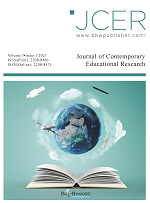Abstract
In the past few decades, there have been eminent interests in reading performance as essential means for language input. In view of that, extensive studies have been conducted to explore the factors that affect reading performance from various aspects. In the cognitive psychology field, some studies have examined the relationship between field dependent-field independent (FD-FI) cognitive styles and working memory capacity (WMC) on English reading, respectively. However, only limited studies focused on the correlation among FD-FI cognitive styles, WMC and English reading performance. Therefore, this study was conducted to explain these correlations. A total of 42 intermediate “English as Foreign Language” (EFL) learners participated in this study. In order to measure the learners’ FD-FI cognitive style, WMC and English reading performance, the Cognitive Style Figures Test, reading span task and the International English Language Test System (IELTS) reading test were adopted, respectively. Data analyses such as Pearson’s correlation, independent sample t-test and two-way ANOVA were done using Statistical Package for the Social Science (SPSS) version 25. The results suggested a statistically significant correlation between FD-FI cognitive style and WM with English reading performance, respectively. The main effect of WM and FD-FI cognitive style is significant while the interaction between them is not significant in reading performance.
References
Messick, S(2009). The Nature of Cognitive Styles: Problems and Promise in Educational Practice. Educational Psychologist, 19(2): 59-74.
Jourdain, S(2010). Second Language Acquisition: An Introductory Course. The Modern Language Journal, 94(2): 348-349.
Zhang, M., et al(2020). Effect of Cognitive Style on Language Control during Joint Language Switching: An ERP Study. Journal of Psycholinguistic Research, 49(3): 1-18.
Baddeley, A(2003). Working Memory and Language: An Overview. Journal of Communication Disorders, 36(3): 189-208.
Witkin, H(1971). A. et al. Field-dependent and Field-independent Cognitive Style and Their Educational Implication. Review of Educational Research, (47): 1-64.
Ehrman, M., Leaver, B. & Seyyedrezaie, S(2003). A Brief Overview of Individual Differences in Second Language Learning. System, (31): 313-333.
Cassidy, S(2004). Learning styles: An Overview of Theories, Models and Measures. Educational Psychology, (24): 419-444.
Baddeley, A., et al(2010). Is the Hippocampus Necessary for Visual and Verbal Binding in Working Memory?. Neuropsychologia, 48(4): 1089-1095.
Baddeley, A(2000). The Episodic Buffer: A New Component of Working Memory?. Trends in Cognitive Science, 4: 417-423.
Baddeley, A, Hitch, G(1974). Working memory. Psychology of Learning and Motivation. 8:47-89.
Daneman, M., Carpenter, P(1980). Individual differences in working memory and reading. Journal of Verbal Learning & Verbal Behavior, 19(4): 450-466.
Miller, G(1995). The Magical Number Seven, plus or minus Two Some Limits on Our Capacity for Processing Information. Harvard University Press, 15.
Goodman, K(1999). A Psycho-linguistic Guessing Game. Journal of the Reading Specialist, 126-135.
Sabet, M., Mohammadi, S(2013). The Relationship between Field Independence/Field Dependence Styles and Reading Comprehension Abilities of EFL Readers. Theory and Practice in Language Studies, 3(11): 2041-2150.
Nozari, A., Siamian, H(2015). The Relationship between Field Dependent-Independent Cognitive Style and Understanding of English Text Reading and Academic Success. Materia Socio Medica, 27(1): 39-41.
Dai, Y(2002). FI-FD Cognitive Style and Second Language Acquisition. Foreign Language Teaching and Research, 34(3): 203-240.
Xu, W(1999). FI-FD Cognitive Style and College English Teaching. Foreign Language and Their Teaching, 4: 52-52.
Andy, V., Ramzi, M(2014). Verbal and Visuospatial Working Memory as Predictors of Children Reading Ability. Archives of Clinical Neuropsychology, 29: 467-477.
Wei, J., Ni, C(2018). A Study on the Relationship between Working Memory and L2 Proficiency Level. Foreign Language and Their Teaching, 4: 51-56.
Kerry, A., Emily, E(2018). Does Accuracy and Confidence in Working Memory Performance Relate to Academic Achievement in NAPLAN, the Australian National Curriculum Assessment. Australian Journal of Psychology, 3: 1-8.
Lisbeth, M., Glenn, O(2019). Outliers: Upper Secondary School Students Who Read Better in the L2 than in L1. International Journal of Educational Research, (89): 80-91.
Grimley, M., Banner, G(2008). Working Memory, Cognitive Style, and Behavioural Predictors of GCSE Exam Success. Educational Psychology, 28(3): 341-351.
Alloway, T., et al(2010). Working Memory and Cognitive Styles in Adolescents’ Attainment. Journal of Education Psychology, (80): 567-581.
Keene, F(2017). The Effect of Learners’ Field Independence, Cognitive Strategy Instruction, and Inherent Word-list Organization on Free-recall Memory and Strategy Use. The Journal of Experimental Education, 62(1): 14-25.
Umah, U(2020). Comparison of Students' Covariational Reasoning based on Differences in Field-dependent and Field-independent Cognitive Style. Journal Matematika dan Pendidikan Matematika, 4(1): 41-54.
Wang, X(2017). The Enlightenment of Cognitive Style Differences between Field Dependent and Field Independent Mode on College English Teaching. Journal on Studies in English Language and Literature, 5(6): 31-37.
